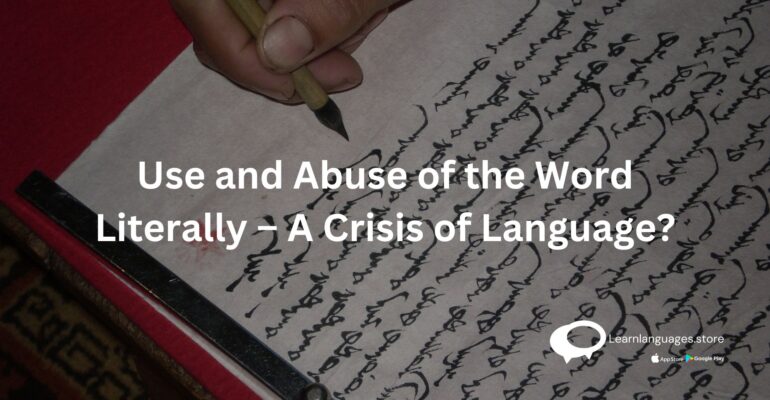Use and Abuse of the Word Literally – A Crisis of Language?
Use and Abuse of the Word Literally – A Crisis of Language?
“That chili blew my head off.”
“She exploded”
“They literally boil my blood.”
Literally.
Editors, academics, linguists, publishers, and journalists hate it because people use it to mean “figuratively,” the opposite.
Encouraged by widespread use in celebrity and pop culture, this innocent(ish) adverb erupted into a nonsensical filler word 20-30 years ago and is today used liberally and without consideration by the young (and old, but especially the young) to add “oomph” to their sentences. The word’s helpful meaning is being eroded by its misuse.
Language crisis.
Some reactions to “literally” suggest that. “Literally” is causing a “literal panic” these days. Linguistic prescriptivists, who like the current English standards, have written dozens of remarks and essays on the matter to show their outrage.
Reality is less extreme.
Let us (figuratively) explore “literally’s” history.
Literally—Language Evolution or Butchery? The Literal Panic began when?
Overusing “literally” feels like a 21st-century problem, but it is not. Literally is nothing new, strange, or damaging, and the current hysteria about the loss of original meaning is largely misguided.
Non-literal “literally” is centuries old!
Additionally, the current contentious meaning—hyperbole and emphasis—developed gradually and legally through time through actual linguistic change processes.
Term Origins
“Literally” comes from French and Latin. Literal means “relating to letters or literature” in French, and litteralis means “taking words in their natural or customary meaning, without any ulterior spiritual or symbolic meaning” in Latin.
The early 1400s saw several words borrowed. Literal and literally (words describing a concept’s core sense) first arose around 1450.
Another literal meaning appeared by 1670. “To indicate that the related phrase or word must be taken in its literal sense, usually to add emphasis,” OED said.
An example:
What was his punishment? Absolutely none.”
Literally’s new meaning, intended to emphasize, led to today’s contentious, hyperbolic use.
Bridging situations allowed the word to shift meaning over time.
Bridging Contexts: Words Gaining Extra Meanings

How Often Does Language Change Happen?
Language evolves gradually.
New words, phrases, and structures become popular among language speakers, leading to widespread use and dictionary standardization.
Since the beginning of time, the dictionary has added new terms.
The Internet, computers, and globalization caused many word meaning changes in the late 20th and early 21st centuries.
Spam, a portmanteau of “spiced ham,” today refers to unwanted digital communications.

Why Is Literally Negative?
Now that we know where modern actually originated from, is it still bad press?
Although it is today considered a contronym (a term with two contradictory meanings), hundreds of other English contronyms (custom, dust, model, etc.) are not as problematic.
The OED has listed the word’s metaphorical definition since 1903, although language prescriptivists—those who oppose semantic change—are the fiercest critics.
Stanford linguist Arnold Zwicky thinks that the recency illusion causes us to condemn the term literally so harshly. We notice “literally” when we know it upsets us.
Language evolves. New words and meanings emerge as old ones fade. Prescriptivists always reject change, but the literal vendetta is peculiar since it is not new.
Literally became a new term in the early 20th century.
Despite its annoyance, everyone understands literally’s exaggerated meaning. The new meaning meets language’s goal of communication, right?
Language evolves, which makes it fascinating.











